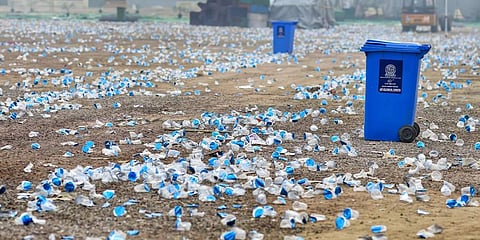

BENGALURU: Indian researchers have found two strains of bacteria that can eat plastic, holding the promise of effectively solving the humongous plastic waste problem. This discovery assumes significance in the background of Prime Minister Narendra Modi’s announcement to eliminate single-use plastic by 2022.
However, the two strains of plastic-eating bacteria — at least for now — do not figure anywhere in BBMP’s plans to target plastic waste.
Researchers at Shiv Nadar University in Greater Noida, Uttar Pradesh, on Thursday announced the discovery of two strains of plastic-eating bacteria that have the potential to solve the problem of plastic waste globally. The bacterial species, Exiguobacterium sibiricum strain DR11 and Exiguobacterium undae strain DR14, were isolated from the wetlands adjoining the university by Dr Richa Priyadarshini and her team at the Department of Life Sciences, School of Natural Sciences.
Their research has revealed that these bacterial strains have the potential to decompose ‘polystyrene’ - a key component in single-use plastic items such as disposable cups, cutlery or packaging material.
The plastic industry produces approximately 14 million metric tonnes of polystyrene, which is non-biodegradable. This affects both terrestrial and marine life. For instance, a plastic fork can take up to 450 years to decompose. In the universe of plastic items used daily, single-use plastic constitutes about a fifth in volume, estimates the All India Plastic Manufacturers Association. India is drowning in plastic as it consumes 16.5 million tonnes of plastic annually.
The research team found the newly-discovered bacteria used plastic as a carbon source and created biofilms. This alters the physical properties of polystyrene, and initiates a process of natural degradation with the release of enzymes to break the polymer chains - a prospective solution to the plastic waste piling up.
The research has been published in the scientific journal RSC (Royal Society of Chemistry) Advances.
However, BBMP Special Commissioner (SWM), Randeep D, told The New Indian Express, “As far as Bengaluru is concerned, we have a different policy. We are looking at disposing plastic but in turn looking at recycling it. The non-recyclable plastic is being sent to the cement factory for processing. We have even given plastic to KIA to make roads. We do have a sustainable approach and we don’t feel the need of having a plastic-eating bacteria right now.”
26K tonnes of plastic waste generated a day
The Central Pollution Control Board conducted a study in 60 major cities of India in 2018. It observed that 4,059 tonnes of plastic waste is generated from these cities a day. In fact, India’s four metros generate over 1,670 tonnes of plastic waste per day, which is 40% of the total plastic waste generated by the other 56 cities. With extrapolation of the plastic waste data from 60 major cities, it is estimated that 25,940 tonnes of plastic waste is generated in India each day.